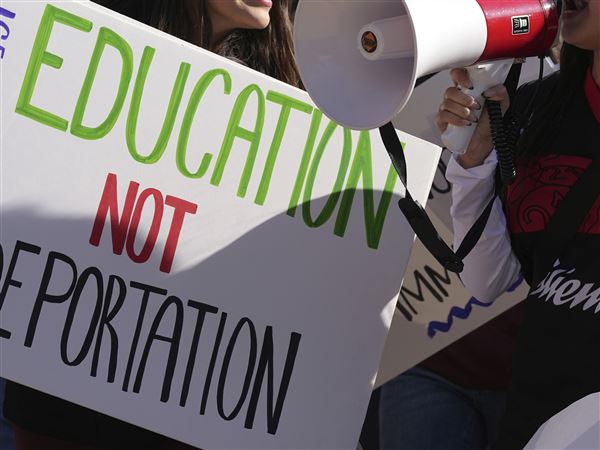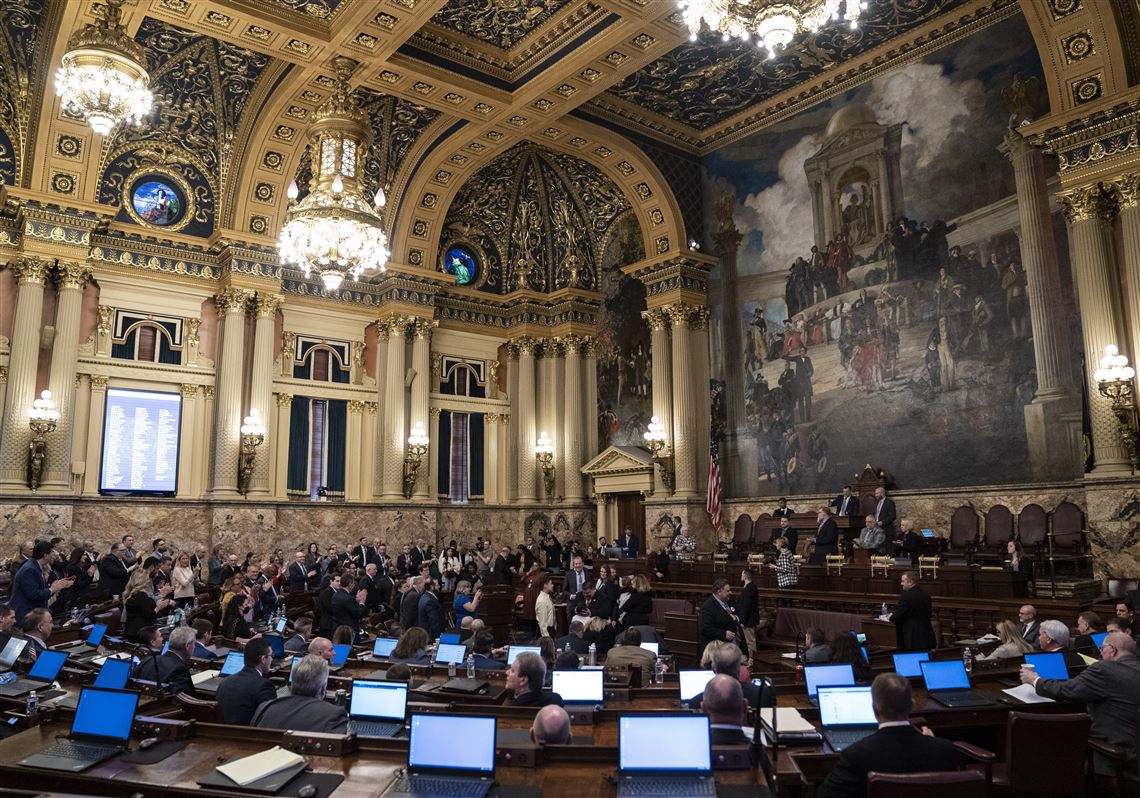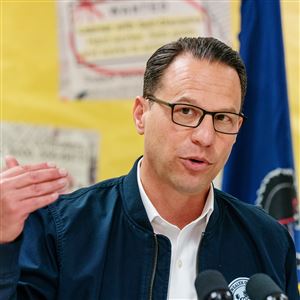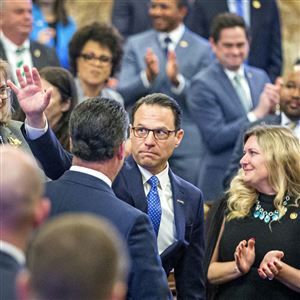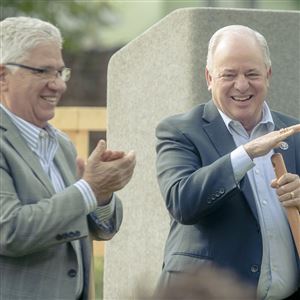HARRISBURG — Partisan face-offs in the state House on Thursday that included one over funding for the University of Pittsburgh gave the clearest sign yet that state budget negotiations could stretch past the June 30 end of the fiscal year.
Aside from a number of budget-related votes, lawmakers advanced other important bills, including final House approval for one that would give Pittsburgh and other Allegheny County communities a faster tool for dealing with blighted properties.
Late Thursday afternoon, Rep. Jordan Harris, D-Philadelphia and chairman of the House Appropriations Committee, told reporters that budget discussions are underway behind closed doors. “There are a lot of folks in both parties that are having conversations,” Mr. Harris said.
But verbal sparring on the House floor earlier in the day indicated big differences remain.
It sprang from a group of special bills on funding Pitt and other state-related universities. Rep. Matt Bradford, D-Montgomery and the Democratic majority leader, and Rep. Bryan Cutler, R-Lancaster and the Republican leader, exchanged jabs over the bills that direct state money to Pitt, Penn State, Lincoln, and Temple University, as well as the University of Pennsylvania’s veterinary school.
Mr. Cutler said that with eight days left in the fiscal year, House Democrats — who have a 102-101 edge in the chamber — have not discussed budget priorities with Republicans. Mr. Cutler said Republicans, who narrowly lost control of the chamber this year for the first time in over a decade, could not vote for important budget bills “without a clear picture on what we are going to spend.”
His objections carried more weight than they would have on other legislation. The university-funding bills require a two-thirds vote for approval in each chamber instead of a simple majority — meaning Democrats would need more than 30 Republicans to help push them through the House.
The votes on the university-related bills taken Thursday were preliminary — final votes could occur as soon as Monday — and while each bill was passed, none received a two-thirds majority. The vote on the Pitt funding bill was 113-90, with 11 Republicans joining all Democrats in favor.
Mr. Bradford accused Mr. Cutler of using students as a negotiating tool and said it was time to pass the university-funding bills. Referring to Mr. Cutler, he said, “The gentleman throws out a lot of smoke.”
In his budget plan announced in March, Gov. Josh Shapiro proposed a 7.1% increase for the four state-related universities — meaning Pitt would get an increase to $162.3 million — plus another $3.6 million for rural education outreach.
Motivating much of the Republican sentiment on Thursday was a statement by University of Pittsburgh officials, who testified in Harrisburg earlier this year that they could not commit to holding tuition steady next school year — even if they received more state funding. Among those who voted no was Rep. Eric Nelson, R-Westmoreland, who said he wanted equal treatment for all students in the state budget instead of favoring “our wealthiest universities” — a reference to Pitt, Penn State and Temple.
“They have billions in endowments” and already have tuition rates above national averages for state universities, Mr. Nelson said. At the same time, he said, community colleges and other universities are struggling.
Rep. Rob Mercuri, R-Allegheny, voted in favor of the Pitt funding bill. Pitt students, he said, need “to be taken care of.” But he said there must be a broader discussion about higher education funding in the state, and the “nuanced voting” on the university bills also reflected members’ desires for that.
In a separate set of votes Thursday, House Democrats overrode Republican objections to pass another series of budget-related bills. Mr. Bradford urged members to approve them, while Mr. Cutler said he could not support them until he had a “better understanding of what is in the budget and what the total spend number is.” Among them were bills funding the state attorney general’s office, the Public Utility Commission, the Philadelphia Parking Authority, and other entities.
Those bills now will go to the Senate.
During the House debate Thursday, Mr. Bradford rebuffed Mr. Cutler’s calls for face-to-face negotiations on the school funding bills. “We don’t need a backroom meeting,” he said.
Speaking to reporters after the session, Mr. Cutler said, “I am tired of them governing toward the next election.”
Mr. Mercuri said in an interview it appeared possible budget negotiations would go beyond June 30. “We hope it doesn’t,” he said.
Veteran Sen. Lisa Boscola, D-Northampton, said it would probably take until July 7 for top lawmakers and Mr. Shapiro to reach agreements and get all necessary budget bills passed and signed into law. Even though that means the state would go through a week of the new fiscal year without an approved budget, Ms. Boscola said it wouldn’t hurt anyone.
“It’s getting it right” that is important, she said. The June 30 fiscal year deadline, she said, is a “talking point. That’s all it is.”
In other Capitol action Thursday:
-
The House gave final approval to the bill that would let Pittsburgh and other Allegheny County communities use a faster process to obtain clear titles to blighted properties. The bill already passed the Senate and now goes to Mr. Shapiro. A spokesperson for the governor did not immediately respond to a request for comment.
Bill sponsor Sen. Wayne Fontana, D-Allegheny, said he believed “wholeheartedly” that Mr. Shapiro would sign the legislation. He said he expected Pittsburgh City Council, land banks, and other entities that could act on the opportunities created by the bill to do so quickly — even though the law would not take effect until 60 days after Mr. Shapiro signs it.
Mr. Fontana first introduced the bill last legislative session. He said he modeled it after a similar law already in place for Philadelphia, and he described it as “a powerful tool to help eliminate blight and create affordable housing.”
The final vote in the House was 149-53, with 48 Republicans joining all Democrats in favor. Among the Republicans who voted no was Rep. Aaron Bernstine, R-Lawrence, who said the bill should not have been limited to Pittsburgh and Allegheny County.
“We could have worked to address the needs of counties across the state,” Mr. Bernstine said.
-
The Senate gave final approval to a bill that would ban the use of handheld cell phones by drivers. Every state that borders Pennsylvania already has such a law in place, and bill sponsor Sen. Rosemary Brown, R-Monroe, has been working on the measure for years. The bill, called Paul Miller’s Law in memory of a 21-year-old man who died in a crash caused by a distracted driver, passed on a 37-11 vote and will now go to the House for consideration.
-
The House gave final approval to a program that would pay stipends to student teachers by a vote of 141-62, with 39 Republicans joining all Democrats in favor of the measure.
The sponsor of the bill, Rep. Danielle Friel Otten, D-Chester, used statistics to paint a grim picture of the worsening teacher shortage, saying 20,000 teachers were certified in Pennsylvania in 2010 and only 7,000 in 2022. The bill, she said, would let the Pennsylvania Higher Education Assistance Agency pay student teachers stipends of up to $15,000 a year. Recipients would have to commit to teaching for two years in Pennsylvania after graduation.
-
The House advanced a measure that would let school districts, career and technical schools and intermediate units apply to the Commonwealth Financing Authority for funding for capital projects like roof repairs, HVAC systems and asbestos remediation. The grants would be capped at 75% of a project’s cost or a maximum of $5 million. A final vote on the bill in the House could take place as soon as Monday.
Ford Turner: fturner@post-gazette.com
First Published: June 22, 2023, 5:37 p.m.
Updated: June 23, 2023, 1:51 p.m.

